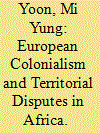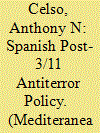|
|
|
Sort Order |
|
|
|
Items / Page
|
|
|
|
|
|
|
| Srl | Item |
| 1 |
ID:
088403


|
|
|
|
|
| Publication |
2009.
|
| Summary/Abstract |
New hopes for a final settlement in Cyprus have recently been raised because of the high-powered talks between President Demetrios Christofias of the Republic of Cyprus and Turkish-Cypriot leader Mehmet Ali Talat. This essay considers how a reunified Cyprus might deal with the nearly seventy casinos currently in "Northern Cyprus", especially as both sides of Cyprus forbid gambling. The author argues that with Turkey and private investors pouring millions of investment dollars into "Northern Cyprus", the changing economic reality of the occupied area is leading inevitably to a changed political reality.
|
|
|
|
|
|
|
|
|
|
|
|
|
|
|
|
| 2 |
ID:
088404


|
|
|
|
|
| Publication |
2009.
|
| Summary/Abstract |
This essay examines how European colonialism continues to underlie most territorial disputes in Africa. How these disputes have been resolved or are likely to be resolved is described, based on the following four long drawn-out disputes: the Nigeria-Cameroon dispute over the Bakassi Peninsula; the Gabon-Equatorial Guinea dispute over the islands of Mbanié, Cocotiers, and Conga in the Corisco Bay; the Mauritius-United Kingdom dispute over the Chagos Archipelago; and the Comoros-France dispute over Mayotte.
|
|
|
|
|
|
|
|
|
|
|
|
|
|
|
|
| 3 |
ID:
088398


|
|
|
|
|
| Publication |
2009.
|
| Summary/Abstract |
The start of the Obama administration offers an opportunity to rebuild the US-NATO transatlantic link on the foundation of shared values during the Cold War and the immediate post-9/11 response. Use of military power is not sufficient, and torture should never again be condoned. Europe and the United States should take the lead in drafting new rules for the global economic order. A renewed NATO is also needed, as is a better relationship with Russia. NATO's eastward expansion to include Georgia and Ukraine makes sense in the long term but should not be pressed now.
|
|
|
|
|
|
|
|
|
|
|
|
|
|
|
|
| 4 |
ID:
088401


|
|
|
|
|
| Publication |
2009.
|
| Summary/Abstract |
Twenty-one countries share the Mediterranean's coastline with no single country responsible for its environmental deterioration or its protection. They are collectively responsible for both. Over four decades, the environmental dimension of Europe's policy toward its Mediterranean neighbors has become increasingly prominent. The central place of environmental projects in the Union for the Mediterranean, launched in July 2008, is the clearest indication of the growing place of the environment in Mediterranean cooperation. Growing public and political awareness of environmental problems in the region argue for a more concerted approach, embracing United Nations, European Union, and national initiatives-and a more "singular" approach to shared challenges.
|
|
|
|
|
|
|
|
|
|
|
|
|
|
|
|
| 5 |
ID:
088402


|
|
|
|
|
| Publication |
2009.
|
| Summary/Abstract |
Is globalization forcing economies that are not coordinated market economies, such as Spain's, to converge on a British-American model? This essay seeks to build on the hypotheses generated by the literature on varieties of capitalism to analyze the challenges of developing and sustaining coordination while adjusting for economic change. In particular, it seeks to explore ways in which subnational factors promote the ability of socioeconomic actors to develop public-private institutions. By focusing on a particular autonomous region of Spain, the Basque Country, this article explores the role of institutional arrangements at the regional level in determining national adjustment. In the Basque Country the relative power and the particular interests of the regional state have been central factors in promoting distinctive patterns of coordination. At the same time, actors' preferences and policy outcomes have been constrained by the differences in the quality and configuration of institutional frameworks, political deals, and the existing economic structure.
|
|
|
|
|
|
|
|
|
|
|
|
|
|
|
|
| 6 |
ID:
088406


|
|
|
|
|
| Publication |
2009.
|
| Summary/Abstract |
Increasingly, Central Asia, and specifically the Caspian Sea Basin (CSB), is becoming a crowded place, as government officials and oil interests from European Union countries, the United States, Russia, China, Iran, Turkey, and elsewhere (including increasingly energy-thirsty India) vie for partnerships with the energy-rich former Soviet republics. Russia lays special claim to what it sees as its "near abroad" (notably, the Caucasus and Central Asia), and its leaders strive to limit US influence over the energy resources of the CSB. China, a global economic power still in ascension, not only works with Russia to counter US influence in the area but also seeks to develop and import more of the region's energy resources to fuel its economic expansion. Both China and Russia aim to curb rising Islamic influence in the region. This essay examines the interests and policies in the CSB of Russia and China, respectively, since the end of the Cold War and their bilateral relationship. While the two countries enjoy a strategic partnership that serves to counter the United States economically, politically, and militarily, lingering mistrust and divergent policy interests could work to limit the extent of this relationship between these two giants of the non-Western world.
|
|
|
|
|
|
|
|
|
|
|
|
|
|
|
|
| 7 |
ID:
088405


|
|
|
|
|
| Publication |
2009.
|
| Summary/Abstract |
In June 2006, the forces of the Islamic Courts Union (ICU) took control of Somalia's capital, Mogadishu. During the six-month rule by the ICU, Mogadishu became relatively stable, but efforts to bring peace did not lead to a major breakthrough. On 28 December 2006, Ethiopian troops captured Mogadishu with little resistance from the ICU. The Ethiopian intervention has led to more chaos and instability in Somalia over the past two years. In November 2008, the Ethiopian government announced that its forces would pull out of Somalia by the end of 2008. In June 2008, the Transitional Federal Government and the Alliance for the Re-Liberation of Somalia (ARS), a group dominated by members of the ICU, signed an agreement in Djibouti mediated by United Nations special envoy Ahmedou Ould-Abdullah. The next phase of the Somali conflict is likely to occur between the ARS and al-Shabaab, a group determined to expand its influence and control beyond Mogadishu. Meanwhile, Somali pirates have intensified their attacks in the Gulf of Aden, carrying out attacks on more than ninety commercial ships and successfully hijacking more than thirty-five ships in 2008. The pirates have earned more than $50 million in ransom payments and have released a number of the ships and crew members. The United States, Russia, India, and several other countries have deployed warships to tackle piracy in the Horn of Africa region, although the problem still persists.
|
|
|
|
|
|
|
|
|
|
|
|
|
|
|
|
| 8 |
ID:
088399


|
|
|
|
|
| Publication |
2009.
|
| Summary/Abstract |
Elected on a platform of withdrawal from Iraq after the 3/11 train bombings, Spanish socialists sought early on to embark on an antiterrorist policy of negotiation and dialogue with disgruntled Arab and Basque communities. The socialists' early efforts at achieving a historic accord with the Basque separatist organization ETA and its willingness to accommodate and integrate North African diaspora communities have floundered. Faced with repeated terrorist attacks and plots, the socialists have reversed course and have moved decisively toward a more draconian law enforcement model in their prosecution of Basque and Islamist militants
|
|
|
|
|
|
|
|
|
|
|
|
|
|
|
|
|
|
|
|
|